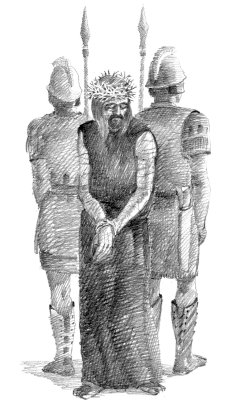THE WORD IS |
 John 19:5 "Behold the man!" "I'm at my wits' end, I can't go on", someone may cry out when life's skein seems to be hopelessly entangled. That which brought pleasure before has now led to despair and wretchedness. Others do not understand. They only say: "He has only himself to blame." But this causes further agony because it's true. He who has fallen is condemned by the people around him as well as by his own heart. At the same time he feels the pressure of God's wrath. There is no place to which he can escape. He is alone, but at the same time in God's presence ? guilty. The words of the Psalmist are descriptive: "My sin is ever before me" (Ps. 51:5). "Where can I go from Thy Spirit? Or where can I flee from Thy presence? If I ascend to heaven, Thou art there; if I make my bed in Sheol, behold, Thou art there" (Ps. 139:8). With a person like this in mind, we can repeat the words familiar to us from the Passion of Christ: "Behold, the man!" (John 19:5). Jesus' suffering, however, was in some respects different. He indeed felt God's wrath deep in His soul. He too was alone: "My God, My God, why hast Thou forsaken Me?" (Matt. 27:46). But Jesus' suffering was different in the respect that He did not suffer because of His own sins. He Himself was innocent. Our sins had been charged to Him. This is why He could not lose confidence in the Father. Confidently He was able to say: "Father, into Thy hands I commit My Spirit" (Luke 23:46). With the same confidence He was able to comfort the repentant criminal and look beyond death to the blessed life of Paradise. Jesus' suffering comforted the criminal, and brings peace even now to every troubled soul who trusts in Jesus. God's Son has once suffered God's wrath in behalf of us all. In Him, in such an amazing way, God's everlasting love was revealed. Of those who are troubled to the point of despair, we can with pity say: "Behold, the man!" But this will not help them. The New Testament instead says to the despairing: "Man, behold Jesus!" That is why God's Son came to earth, so that "He might destroy the works of the devil" (1 John 3:8). Committed sins remain committed and we must bear temporal consequences. But the forgiveness earned by Jesus solves the problem in God's sight. It grants peace to the conscience. It also gives us the desire and strength to do that which is right from now on. |



